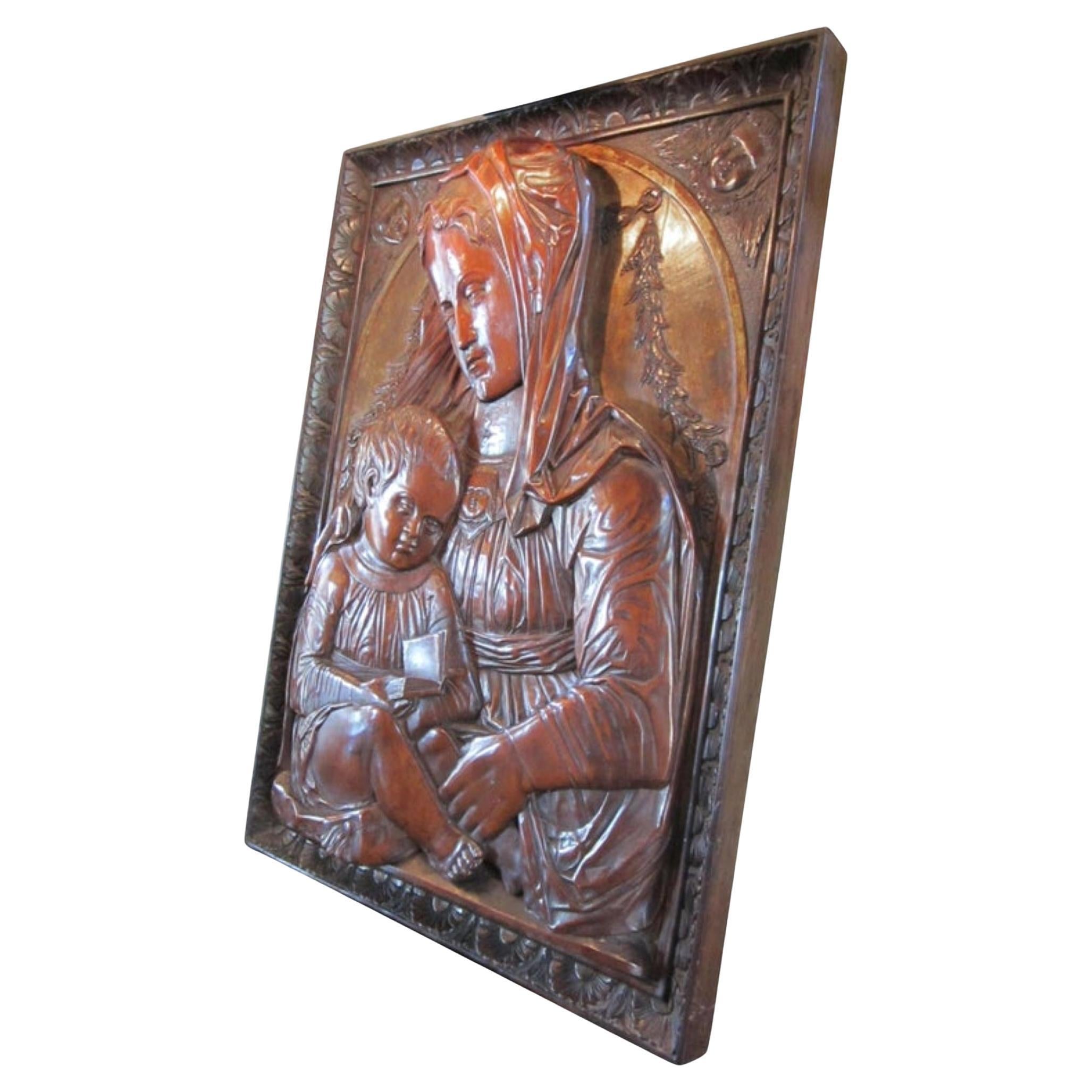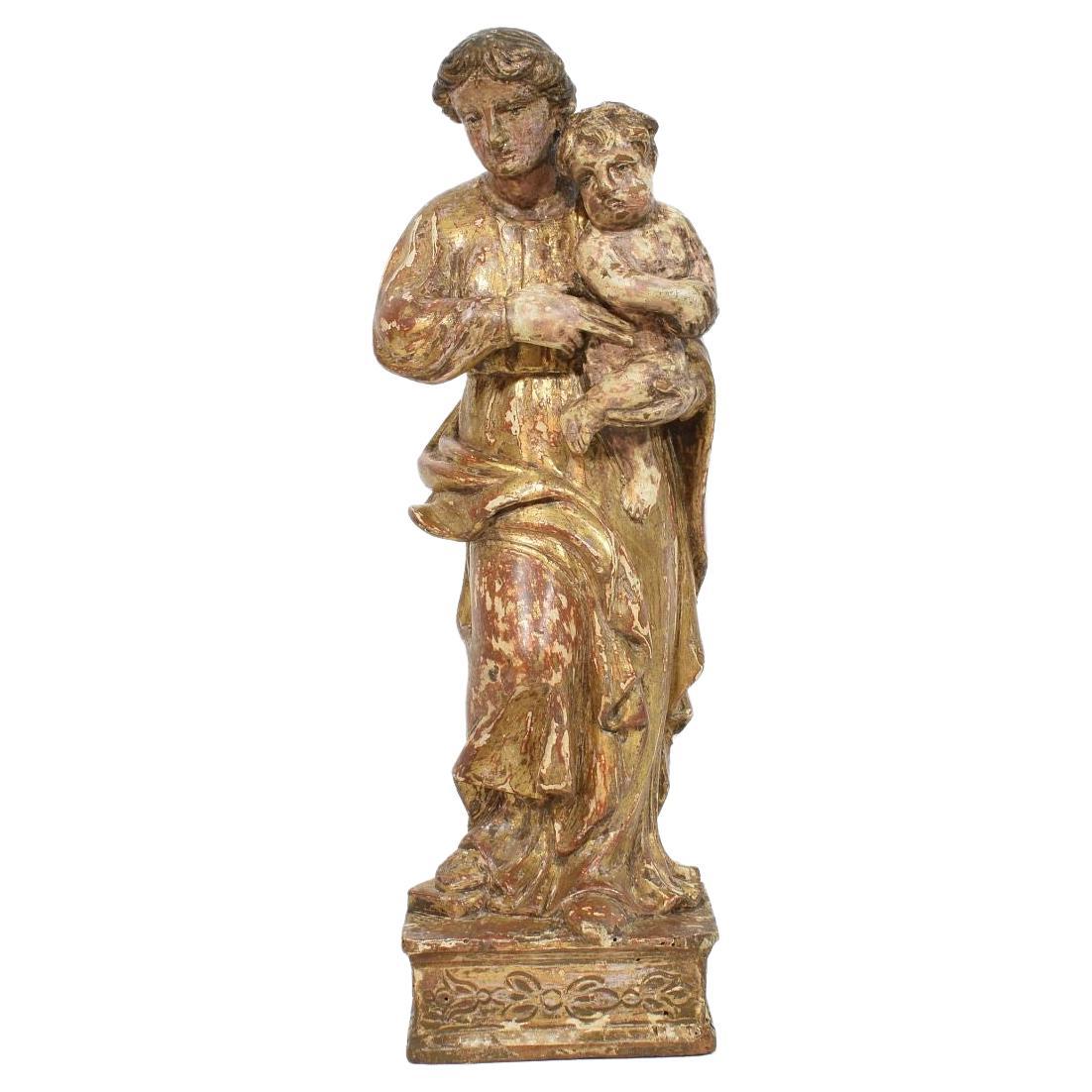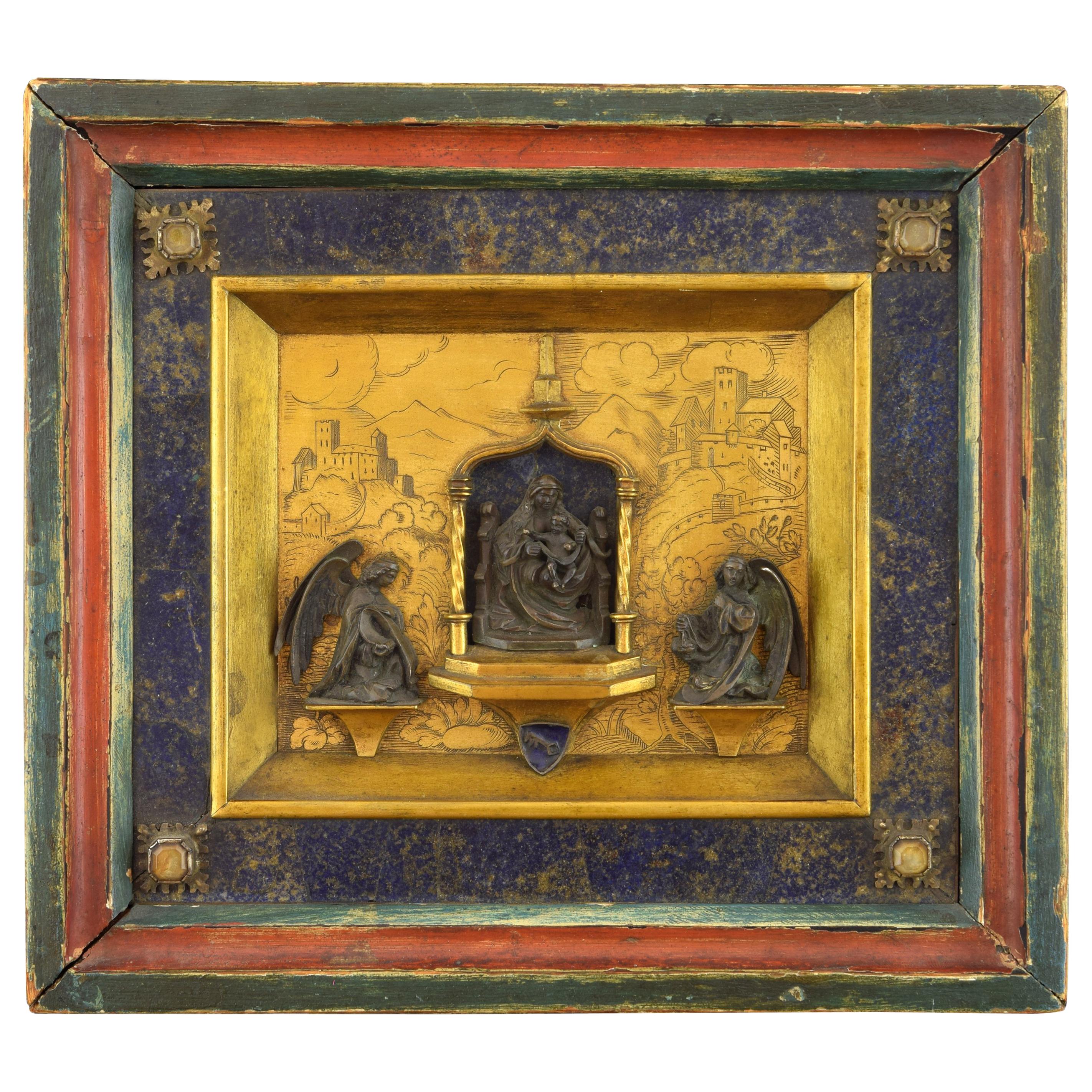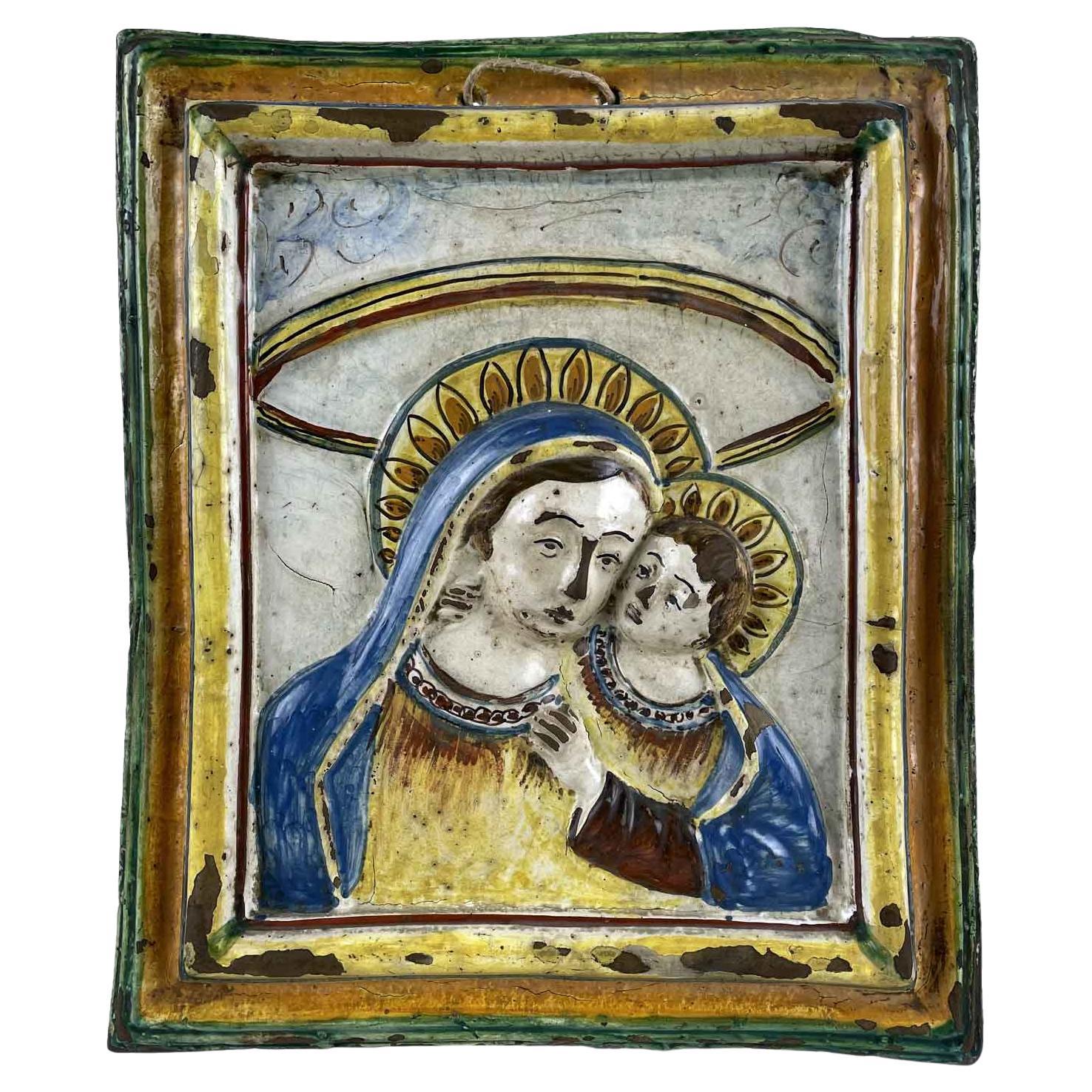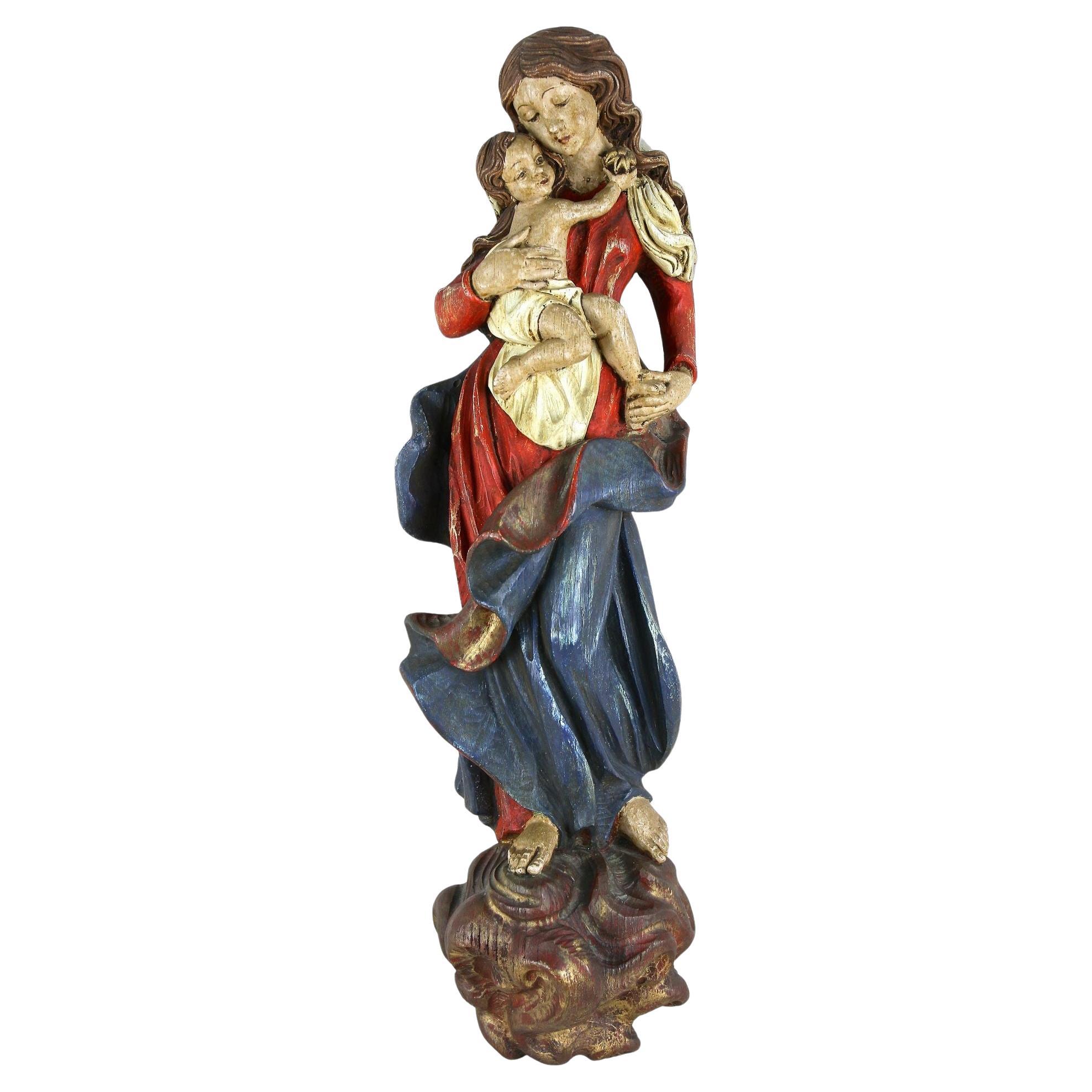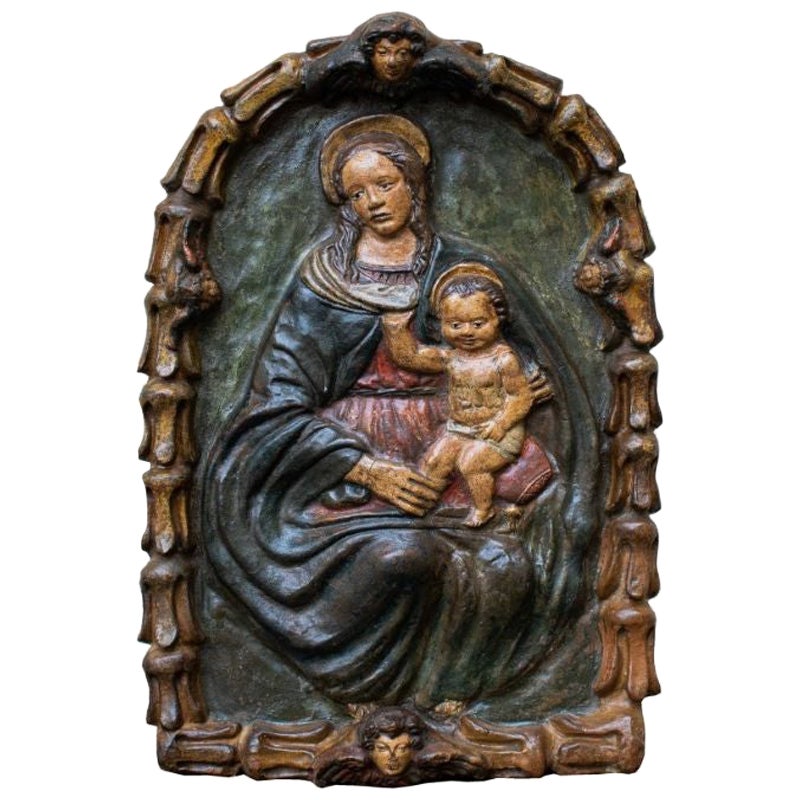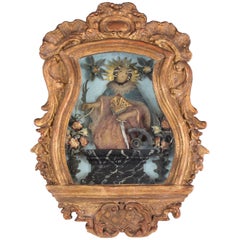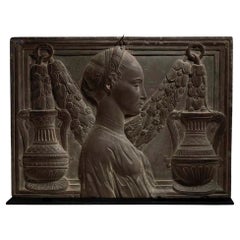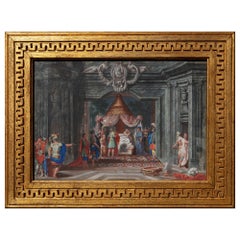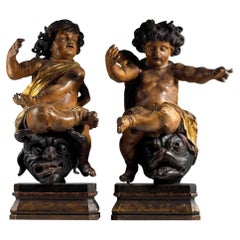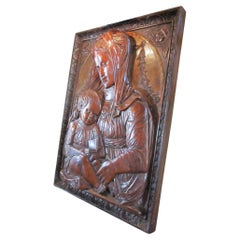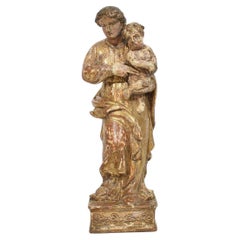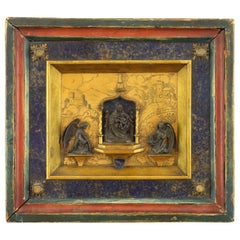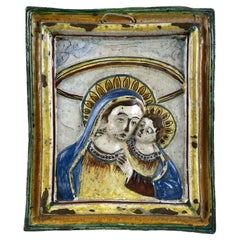Items Similar to Terracotta Relief of the Virgin and Child Appearing to St. Philip Neri
Want more images or videos?
Request additional images or videos from the seller
1 of 6
Terracotta Relief of the Virgin and Child Appearing to St. Philip Neri
$109,134.68
£80,000
€94,024.44
CA$152,839.30
A$168,029.43
CHF 86,857.02
MX$2,010,579.25
NOK 1,096,550.23
SEK 1,028,046.50
DKK 702,227.10
About the Item
A mid-18th-century Italian terracotta relief of the Virgin & Child appearing to St Philip Neri In a silver filigree, gilt-bronze and gilt-copper-mounted, lapis lazuli and wood frame.
Known as the ‘Apostle of Rome’ due to his labours amongst the sick and poor of the city, Philip Neri (1515-1595) became an influential figure of the Counter-Reformation. Many miracles were attributed to him, and he was beatified by Paul V in 1615. His popularity and place in the folklore of Rome created a demand for his depiction within the church.
For example, Carlo Maratta’s painting for San Giovanni dei Fiorentini, the preliminary study for which bears relation to the present composition (Royal Collection, inv. 905553). The fresh and freely modeled handling of the present relief is in the tradition of Giovanni Antonio Mazzuoli’s (1644-1706) small-scale modelli for altarpieces (C. Sisi and G. Gentilini, La Scultura : bozzetti in terracotta, piccoli marmi e altre sculture dal XIV al XX secolo, Florence, 1989, nos. 92-95).
Additional information:
Origin: Italy
Period: Circa 1750, 18th Century
Style: Religious, The Virgin and Child
Dimensions:
Height: 51 cm (20.08 inches)
Width: 34.5 cm (13.58 inches)
The mid-18th-century Italian terracotta relief of the Virgin & Child appearing to St. Philip Neri is a beautiful example of religious art from the Counter-Reformation period. St. Philip Neri was an important figure in the Catholic Church during the Counter-Reformation, a time when the Church was seeking to combat the influence of Protestantism in Europe. Neri was known for his work among the sick and poor in Rome and was beatified in 1615 by Pope Paul V, which contributed to his popularity and the demand for his depiction within the church.
The relief depicts the Virgin and Child appearing to St. Philip Neri, and is presented in an ornate frame made from silver filigree, gilt-bronze, gilt-copper, and lapis lazuli. The frame is made of wood and adds to the overall beauty of the piece. The relief's style is reminiscent of Carlo Maratta's painting for San Giovanni dei Fiorentini, which also depicted St. Philip Neri, and it is believed that the present relief was influenced by Maratta's work.
The present relief's handling is fresh and freely modeled, which is in keeping with the tradition of small-scale modelli for altarpieces by Giovanni Antonio Mazzuoli. Mazzuoli was a renowned Italian sculptor of the 17th century, and his small-scale works were often used as preliminary studies for larger, more elaborate sculptures.
Overall, this relief is a stunning example of Italian religious art from the mid-18th century, and its ornate frame only adds to its beauty and value. Its depiction of St. Philip Neri, a significant figure in the Catholic Church during the Counter-Reformation, makes it a valuable piece of art for collectors and historians alike.
- Dimensions:Height: 20.08 in (51 cm)Width: 13.59 in (34.5 cm)Depth: 2.37 in (6 cm)
- Style:Baroque (Of the Period)
- Materials and Techniques:
- Place of Origin:
- Period:
- Date of Manufacture:circa 1750
- Condition:Wear consistent with age and use.
- Seller Location:London, GB
- Reference Number:Seller: 128261stDibs: LU1204233097742
About the Seller
4.9
Vetted Professional Seller
Every seller passes strict standards for authenticity and reliability
Established in 2012
1stDibs seller since 2015
118 sales on 1stDibs
Typical response time: <1 hour
- ShippingRetrieving quote...Shipping from: Camberwell, United Kingdom
- Return Policy
Authenticity Guarantee
In the unlikely event there’s an issue with an item’s authenticity, contact us within 1 year for a full refund. DetailsMoney-Back Guarantee
If your item is not as described, is damaged in transit, or does not arrive, contact us within 7 days for a full refund. Details24-Hour Cancellation
You have a 24-hour grace period in which to reconsider your purchase, with no questions asked.Vetted Professional Sellers
Our world-class sellers must adhere to strict standards for service and quality, maintaining the integrity of our listings.Price-Match Guarantee
If you find that a seller listed the same item for a lower price elsewhere, we’ll match it.Trusted Global Delivery
Our best-in-class carrier network provides specialized shipping options worldwide, including custom delivery.More From This Seller
View All18th Century Icon, Wax Portrait Giltwood Frame
Located in London, by appointment only
Rare 18th century giltwood framed carved and polychrome wax silver and gold decorated figure of saint Catherine of Alexandria icon, with original gilt frame. The rarity of this piece...
Category
Antique 18th Century Italian Rococo Wall-mounted Sculptures
Materials
Gold Leaf, Silver Leaf
$2,728 Sale Price
20% Off
Renaissance Revival Pietra Serena Carved High Relief Plaque
Located in London, by appointment only
An exceptional high relief Renaissance Revival carved black Pietra Serena panel.
The right facing profile bust of a lady in front of a garland of flowers and leaves suspended above ...
Category
Antique 16th Century Italian Renaissance Decorative Art
Materials
Slate
French School, circa 1700 Judith and Her Handmaiden with the Head of Holofernes
Located in London, by appointment only
French School, circa 1700 Judith and her handmaiden with the head of Holofernes, with sleeping guards in an architectural setting; and Alexander holding Parmenio's letter, defiantly ...
Category
Antique Early 18th Century French Louis XIV Paintings
Materials
Oak, Paper
Pair of North European Baroque Cherubs, 17th Century
Located in London, by appointment only
A pair of mid 17th century carved wooden and painted highly animated triumphant cherubs
Each seated on the heads satanic gargoyles. Parcel-gilt and retaining their original paint su...
Category
Antique 17th Century Dutch Baroque Pedestals and Columns
Materials
Wood
$24,555 / set
17th Century Baroque Painted 6 Fold Screen Don Quixote
Located in London, by appointment only
An exceptional late 17th-century Anglo-Dutch painted screen, composed of six hinged panels, richly decorated in oil paint on canvas on board. The ...
Category
Antique 17th Century Dutch Baroque Screens and Room Dividers
Materials
Canvas, Wood
Important Rare Set of Nine Appliqué Silk Panels by Marianna Elmo
Located in London, by appointment only
Important and rare set of nine exquisite New Testament silk thread appliqué panels known as Broderies à fils collés. Each panel depicts a distinct biblical scene, rendered with remarkable precision and delicacy. Signed Marianna Elmo, Italy, Lecce, circa 1750.
Italy
Circa 1750, 1755
Frame H: 95 cms (37.5 ins)
Frame W: 75 cms (30 ins)
Panel Height : 26 cms (10.2 ins)
Panel Width: 20 cms (7.9 ins)
Centre Height: 24 cms (9.5 ins)
Centre Width: 18 cms (7 ins)
Divine Threads: A Set of Nine New Testament Appliqué Panels by Marianna Elmo
Scenes from the New Testament
The scenes include the Annunciation, the Visitation, the Nativity, the Holy Family (x2), The Holy Father and Jesus, Jesus taken to the temple, the raising of Lazarus from the dead, and the Resurrection. Each is rendered with remarkable precision and delicacy.
Marianna Elmo
Daughter of painter Serafino Elmo, an important artist in Lecce during the 18th century, Marianna was an embroiderer who used the technique of broderie à fils collés (glued thread embroidery). She created images and landscapes by gluing polychrome silk threads onto a cardboard support, covered with a layer of virgin wax. The faces and limbs of the figures are crafted from cut silk or satin shapes, further painted with tempera or watercolor to achieve lifelike detail. The panels contain many figures embroidered and painted with remarkable skill.
Marianna translated the paintings of her father and of famous painters of the seventeenth and eighteenth centuries into colored threads and is considered the leader of the school of Lecce embroiderers. Her fame reached Naples. Leonardo Quesi, Amato Quesi, Gaetano and Angelo Pati, and Irene Elmo, Marianna’s sister, belonged to this school.
Marianna’s work is recognized for its technical brilliance and artistic sensitivity. Two dated works by her hand are known in museum collections: *The Flight into Egypt* (1752, Museum of San Martino, Naples) and a casket reliquary of St. Mary of Banzi (1754, Banzi, Province of Potenza). Additionally, the Pinacoteca Provinciale di Bari holds two signed pieces by the artist.
The panels were often used in religious settings or as embellishments for sacred objects. The compositions are inspired by prints, a common practice among embroiderers of the period, and feature key moments from the New Testament, including scenes from the life of Christ and the Virgin Mary.
Medium
The images are created using the technique known as broderie à fils collés, where thin polychrome silk threads and metal threads are meticulously applied side by side onto a virgin beeswax-coated cardboard base. The faces and limbs of the figures are crafted from cut satin shapes, further painted with tempera or watercolor to achieve lifelike detail. The panels contain many figures embroidered and painted with remarkable skill.
Dimensions
– 8 panels: 26 x 20 cm each
– Centre panel: 24 x 18 cm
Provenance
Acquired from Sotheby’s, London, in the 1960s by the owner’s father; reframed in Paris by Christian de Beaumont...
Category
Antique Mid-18th Century Decorative Art
Materials
Silk
You May Also Like
Carved Fruitwood Plaque of Virgin and Child Madonna, after Donatello Sculpture
Located in West Hollywood, CA
Carved Fruitwood Plaque of Virgin and Child Madonna, after Donatello Sculpture . A Large Beautiful 18th/19th Century Carved Relief Fruitwood partially gilt of “ MADONNA AND CHILD” , ...
Category
Antique 18th Century Italian Wall-mounted Sculptures
Materials
Wood, Giltwood
$12,800 Sale Price
20% Off
18th Century Italian Neoclassical Carved Wooden Madonna With Child
Located in Buisson, FR
Beautiful weathered neoclassical Madonna with child. Traces of original color and gilding visible,
Italy, circa 1760-1800.
Weathered small losses and old repairs.
More photo's availa...
Category
Antique 18th Century Italian Neoclassical Religious Items
Materials
Wood
$799 Sale Price
50% Off
"Madonna with Child and Angels". Italy, 15th-16th Centuries
Located in Madrid, ES
Bronze in its color and gold, lapis lazuli, rock crystal, enamel.
In the centre of the work is presented, enthroned, the figure of Mary, with a mantel (fireplace) on her shoulders and hair and holding on her knees the child, who appears addressing one of the angels. The virgin is also sheltered by an ogee arch supported on turned columns, and raised visually by steps. This composition achieves a very striking contrast: the dark bronze figure, in contrast to the lapis lazuli background and the part of the arch and the outside of it, in gilded bronze. Under the steps there is a heraldic enamel shield with a key on an azure background. The angels, kneeling, are flanking this figure, and, appearing in dark bronze, visually share the "category" of religious figures with Mary, while their (lower) position gives more status to both the Mother and Jesus. The rest of the composition is completed with a delicate landscape: constructions and walls on mountains, clouds in the sky, plants, stones, etc. To the outside, another lapis lazuli frame is placed decorated in the corners with appliques, giving way to carved and polychrome wood. The lapis lazuli is a semiprecious stone already known in the seventh millennium BC., found in deposits from the Caucasus to Mauritania. From the end of the middle ages, it increased its export to Europe, its use being more frequent since then both to use it as a pigment in paintings after grinding it (giving rise to the finest and most expensive of the blues, and of the colors in many occasions), as for backgrounds of paintings, incrustations in works of art, jewelry and, a little later, in the well-known "hard stone works". The figure of Mary still shows an influence of Gothic models, although more European than Italian, along with elements that could already show a closeness to the Renaissance: although the nakedness of Jesus is already shown in Gothic works (Madonna with Angels by Fra Angelico ), the creation of space by playing with the cloth in front of Christ can be appreciated in more advanced paintings (Virgin with Child by Domenico Ghirlandaio, National Gallery of London); the presence of a powerful throne can be seen frequently in Italian Madonnas of the Quattrocento (and before), but not quite as presented here. As for the landscape, it is necessary to compare it, for example, with that of the fresco of the Condotiero Guidoriccio de Fogliano (Simone Martini, finished in 1328). This is a work of great technical and aesthetic quality, not to mention the materials chosen for its creation, comparable only to outstanding examples from around the world, such as those preserved in the Palazzo Madama in Torino (Italy), where the coral It also has an important role. It is essential to mention, also, works such as the plate of hard stones (lapis lazuli between them) with a relief of Mary with the Child in...
Category
Antique 16th Century Italian Renaissance Religious Items
Materials
Lapis Lazuli, Bronze, Enamel, Other
17th Century Italian Faience Madonna with Child Relief Wall Plaque
Located in Milano, MI
A fashinating 17th century Italian Virgin with Child, an hand-made rectangular shaped relief devotional plaque in polychrome glazed terracotta depicting a Madonna with Child, dating ...
Category
Antique Mid-17th Century Italian Renaissance Decorative Art
Materials
Terracotta
18th Century Polychrome Virgin & Child Wall Sculpture, Handcarved, AT ca. 1760
Located in Lichtenberg, AT
Exceptionally beautiful, polychromed figural baroque wall sculpture from the period around 1760 in Austria. By showing real craftsmanship, this fantastic looking, sacred wall sculptu...
Category
Antique Mid-18th Century Austrian Baroque Wall-mounted Sculptures
Materials
Softwood
17th Century Madonna with Child from the Impruneta Tondo Polychrome Terracotta
Located in Milan, IT
Tuscan school, 17th century
Madonna with Child - from the Impruneta Tondo
Measures: Polychrome terracotta, 65 x 46 x 10 cm
This polychrome terracotta relief, gently jutting...
Category
Antique 17th Century Italian Abstract Sculptures
Materials
Terracotta
More Ways To Browse
Harris G Strong
Lace Doilies
Large Italian Wood Panels
Large Mexican Wall Art
Leonardo Collection
Limoges Porcelain Plaque
Louis Vuitton Framed Art
Maitland Smith Painted Panels
Maurice Picaud
Panton Fabric Art
Skateboard Wall Art
Tudor Wall Art
Vintage Chinese Wall Fan
Vintage Country Dresses
Vintage Floral Wall Tiles
Vintage Tribal Mask
Wood Art Collage Brutalist
1950s Tile Art
